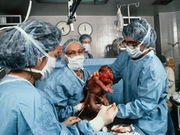Cesarean delivery associated with positive and negative outcomes; few associations seen overall
MONDAY, Oct. 12, 2015 (HealthDay News) — Cesarean section seems to be associated with few physical and socio-emotional outcomes, and the correlations are not consistent through childhood, according to a study published online Oct. 12 in Pediatrics.
Stephen J. Robson, M.D., M.P.H., from the Australian National University in Canberra, and colleagues examined the correlation between cesarean delivery and physical and socio-emotional outcomes from 0 to 7 years using five waves of data from the Longitudinal Study of Australian Children. Data were obtained for 5,107 children born in 2003 and 2004.
The researchers found that children born by cesarean delivery were more likely to have a medical condition at 2 to 3 years and use prescribed medication at 6 to 7 years (odds ratios, 1.33 and 1.26, respectively). They were also more likely to have a higher body mass index at 8 to 9 years (coefficient, 0.08); maternal obesity mediated this effect. For children born by cesarean delivery, parent-reported quality of life was lower for those aged 8 to 9 years (coefficient, −0.08), but not for younger children. However, better parent-reported global health at 2 to 3 years (odds ratio, 1.23) and prosocial skills at 6 to 7 years (coefficient, 0.09) were reported for children delivered by cesarean section.
“This study does not support a strong association between cesarean delivery and poorer health or neurodevelopmental outcomes in childhood,” the authors write.
Copyright © 2015 HealthDay. All rights reserved.








